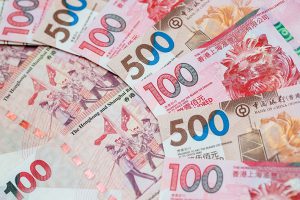BLOOMBERG
The Hong Kong dollar is poised for its biggest monthly retreat since 1985 as interest rates in the city drop and pessimism towards China’s economy weighs on the stock market. The currency has declined 0.6% in August — or almost half the maximum swing possible under its trading band with the greenback — to approach the weak end of its permitted range.
Traders are shorting the currency to buy the higher-yielding US dollar as local borrowing costs fall — a strategy known as a carry trade. One-month SOFR now offers 1.6 percentage points more than the Hong Kong equivalent, the biggest premium since May. Less than four weeks ago the two were at parity.
The drop in the Hong Kong interbank rate has been partly triggered by investors unwinding leverage in the stock market, according to Cheung Chun Him, a strategist at Bank of America Corp.
“We judge the current level of Hong Kong dollar funding to be excessively loose, reflective of the very weak financial sentiment tied to Chinese and Hong Kong-listed equities,” Cheung said. “If the Chinese government presents a credible fiscal plan to address the economic issues in mainland China, this can improve equity sentiment and cause a significant tightening in Hong Kong dollar funding.”
The Hang Seng Index has fallen 8% this month through Tuesday, its worst performance since May. Chinese authorities have launched a number of measures to support the nation’s equities, helping stabilise losses, although foreign investors continue to be net sellers.
Diminishing liquidity is aggravating swings in the Hong Kong dollar. Repeated interventions by the Hong Kong Monetary Authority to stop the currency from moving beyond the weak end of its trading band have lowered a gauge of interbank liquidity, known as the aggregate balance, by about 90% in the past couple of years.
Hong Kong set up the currency peg in 1983 to arrest a plunge triggered by concern over talks to hand over the British colony to China. The trading band was widened in 2005, allowing the currency to trade from 7.75 to 7.85 against the greenback. The Hong Kong dollar last traded at 7.8449, compared with 7.7936 at start of the month.
As a small and open economy, Hong Kong is especially vulnerable to money flowing in and out. The city uses the linked exchange-rate system to manage monetary policy and prevent local borrowing costs from diverging too much from US rates.
 The Gulf Time Newspaper One of the finest business newspapers in the UAE brought to you by our professional writers and editors.
The Gulf Time Newspaper One of the finest business newspapers in the UAE brought to you by our professional writers and editors.
